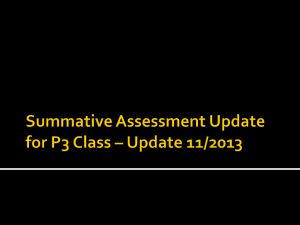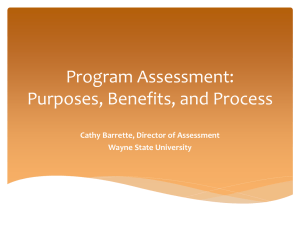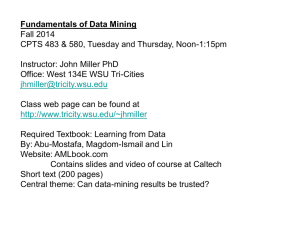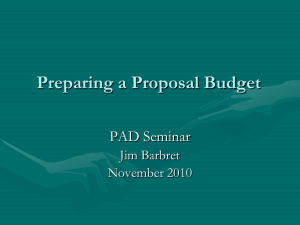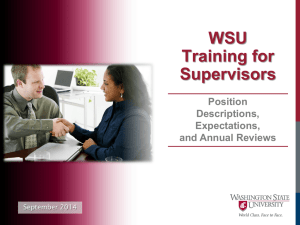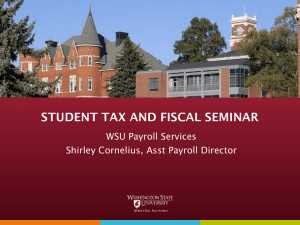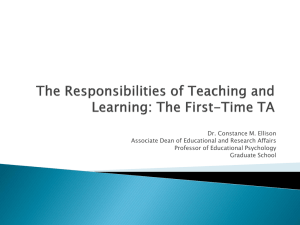Virtual Mentor Program
advertisement
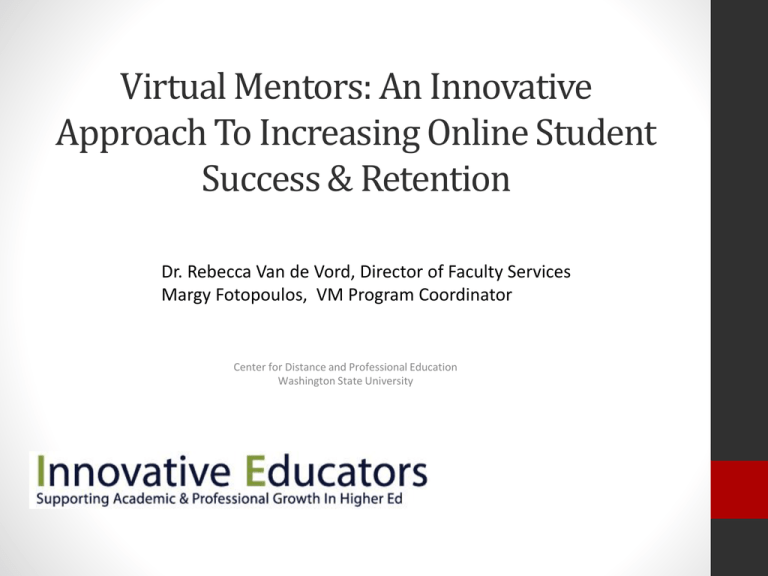
Virtual Mentors: An Innovative Approach To Increasing Online Student Success & Retention Dr. Rebecca Van de Vord, Director of Faculty Services Margy Fotopoulos, VM Program Coordinator Center for Distance and Professional Education Washington State University Speakers: • Dr. Rebecca Van de Vord • Doctorate in Communication • Director of Faculty Services and Instructional Design for the Center for Distance and Professional Education at Washington State University • Published in the area of online education and perceptions of information credibility • Margy Fotopoulos • eLearning Consultant • Online instructional design and faculty support • Virtual Mentor Program Coordinator About Our Participants • Do you have a mentor program currently available for your students? • Is it one-to-one or a mentor for a group or class? • What primary non-academic issue(s) would you identify as barriers to student success in the online classroom? Virtual Mentor Program • A program designed to support students in all non-content areas in an online course, in order to empower students to be successful, thereby positively impacting satisfaction and retention. About the VM Program • Implemented Fall 2003 with 9 courses • Program has grown to 24 Virtual Mentors supporting 93 classes (as of spring 2012) • Funding – Online student fees • Priorities (always at the request of the instructor): • Large enrollment • Blended • Instructors new to teaching online THEORY BEHIND THE PROGRAM: Uniqueness of the Online Environment: Success • Student satisfaction positively influenced the sustainability and scalability of the online program. Menchaca, M. P. & Bekele, T. A. (2008). • Understanding how students succeed online can lead to far greater access and success. More, J. (2009). Question – What do you see as a primary factor(s) in student success in the online environment? Uniqueness of the Online Environment: Challenges • Successful learning at a distance using the Internet also requires special student skills: • Time management, information literacy, technical literacy, access to support services. Rovai, A. P. (2003). • Challenges: clarity of course materials, organization, group dynamics, limited feedback, technical difficulties. Menchaca, M. P. & Bekele, T. A. (2008). • University students possess a core set of technology based skills (mobile phones, email) the patterns of access, and use of a range of other technologies show considerable variation. Kennedy, G. E., Judd, T.S., Churchward, A., Gray, K., & Kraus, K. (2008). Uniqueness of the Online Environment: Community • Students experiencing effective social interactions are most likely to persist from one semester to the next. More, J. (2009). • Distance learners can often feel isolated and lonely. Nash, R. D., (2005). • Students need more support in learning how to contribute to a virtual learning community. Gilbert, J., Morton, S., & Rowley, J. (2007). • Students experience increased satisfaction with online courses when the feeling of remoteness is removed. Steinman, D. (2007). Keys to student satisfaction Based on the research • • • • • • Navigating the course space/Organization Technical support Access to resources Time management Feeling a part of a community Frequent feedback Student Satisfaction = Student Success = Student Retention “Distance education institutions bear considerable responsibility for helping its students to cope with the difficulty inherent in this model of education.” Paul (1988) • Might be addressed by increasing faculty and administrative involvement. Menchaca, M. P. & Bekele, T. A. (2008). • Question – What do you hear from faculty is their biggest concern regarding teaching online? Uniqueness of the Online Environment: Faculty • Survey and qualitative interview studies consistently suggest that faculty perceive online teaching as far more onerous than in the face to face classroom. Bolliger & Waslik, 2009; Concieção, 2006; Harber & Mills, 2008; Lee & Busch, 2005; Nash, R. D., 2005. • Many faculty have no more experience than the students with the technology and community building of the online environment. Program Structure Director of Faculty Services College Liaison VM Program Coord. Support Staff Supervises Lead VM Keeps track of VM hours & paperwork Manages Program Lead VM (hourly employee) Supervises VMS VMs (hourly employees) Work in Course Space Role and Responsibilities of the Virtual Mentor • promote community • make LMS transparent • provide tips, friendly reminders and reach out to students • reach out to those not participating • promote student responsibility for learning • understand VM role • ensure faculty and students understand VM role • participate in VM forum. • the ABC’s of facilitation Recruitment of Virtual Mentors What are we looking for in a VM? • A proven record of success in an online environment • Excellent written communication skills • A desire to help students succeed • Collaborative; enthusiastic • Resourceful; respectful; has initiative but recognizes boundaries • Comfortable with the LMS and technical tools Where do we find potential VMs? We hire from within! • Recommended by an existing or former VM • Recommended by an instructor or advisor • Self identifies Why we hire from within! • Why do we hire our own students/graduates? • They are already familiar with WSU Online culture • Very compatible with existing VMs • They want to give back to a WSU Online, a program that worked for them • We have reliable recommendations VM Application Process • Step 1: Getting in touch • Step 2: Essay on “Why I want to be a VM” • Step 3: Online VM Workshop Online Workshop • The VM Workshop course space: it basically looks like our template for all WSU Online courses. • VM Workshop - 2011_spr_dis_VMWorkshop (https://lms.wsu.edu/section/default.asp?id=2011%5Fspr%5F dis%5FVMWorkshop&ts=1328538739) Online Workshop • Course maintenance • Updates to reflect changes in policies/procedures • Participants • Lead VM • Existing VMs • Potential VMs Skills we want to foster: • Build community • Alleviate feelings of remoteness and isolation • Connect students with each other • Assist students in navigating the course space and using the LMS tools • Steer students to appropriate technical resources • Direct students to resources internal and external to the course space Activities • Pre-Workshop Assessment • Introduce Yourself • Encouraging Social Community • The Virtual Mentor Role • Scenarios • Post-Workshop Assessment What does “community” mean? • The Encourage Social Community exercise asks trainees to choose an image that represents what “community” means to them and they are displayed below. Community! Community! Scenario Example From: Student A To: All course faculty COURSE 101 Subject: What can I do? I am struggling here and this is not like me for a class. I am doing everything I can and plan on doing the extra credit, but this class is like a foreign language to me. Do you have any suggestions for me? I can't fail this class. I double check all my answers and I take the time to read, I am just not understanding. I need help, suggestions....I don’t know. Thank you so much! Student A • Instructions to workshop participants: Remember, this is a safe environment… there are no right or wrong answers! So while keeping in mind the VM role, think about what action you would take if you received this forwarded from an instructor with no additional information provided by the instructor. How would you approach this scenario? Prepare an e-mail for the student and one for the instructor. The VM is not a TA • The VM works only on non-academic matters • The VM does not: • Grade • Answer content-related questions • Act as a liaison between the instructor and WSU Online Next Steps! • Paperwork • Problems encountered • FERPA certification • Shadowing: Partnering with an existing VM for a semester • VM is assigned and enrolled in courses based on instructor request “Within the Summer courses, the VM's offered more extended support and were of great encouragement to myself and other students. It was apparent that they enjoyed connecting with students and were very knowledgeable of tips and ideas to stay focused and on task with course requirements. “ Anonymous, Student VM Evaluation, Summer 2011 “This was my first opportunity to have a VM for the course and I can tell you that this was of huge benefit to me and to the students.” Joan Davenport “Thank you for all your help, both with me and the students! I appreciate all your "behind-the-scenes" assistance! This was my first time teaching WSU Online, and it is VERY different from the classroom.” Renee Edward The VM has been assigned a course • Immediate tasks: • • • • • VM is assigned courses based on instructor requests Contact the instructor Become familiar with the course space Post an introduction (Example) Three-week courses: quick start Ongoing Tasks • • • • • • Reaching out to students who are not participating Checking Discussion Board forums Connecting students with each other Directing students to resources Participating in the VM Perpetual forum Conveying course issues to WSU Online via appropriate channels VM Posts • • • • • • • Providing behavior for students to model Time management suggestions Directing to resources Navigational/technical guidance Reminding students to check deadlines Plan ahead Whatever comes up not related to content The student wrote: confusion regarding chapter 6 I don't know if anyone else is having issues with Chapter 6 and I know we're supposed to be more specific than I don't get it... but I don't get it. The VM responded: Try to re-read it with a cup of coffee and some chocolate - they say it helps your brain :). Anyways, I am no help with course content, but I can direct you to some helpful resources. Once you re-read your chapter, try to identify the first thing you don't understand and create a list of questions and clarifications to email to your instructor and the E-tutoring center mentioned in your Syllabus and my post on 'Help with SPSS'. I would go both ways to hopefully broaden my understanding from everything I can get. Also, if you will have specific questions, you can try Googling them up, maybe there are other resources available explaining the concepts you need help with. Best of luck to you, just keep on trying! From the VM Hi students, As many of you are asking about help with SPSS, I thought I might share a tip I have been finding most useful when it comes to things I don't know, even related to Angel - ‘Google' it up! If its making a graph you need help with, type in 'creating a graph in SPSS' and you will see that there is even a YouTube video on that. I am not an expert in this program either, but I do find Google useful at times like these... :) Also, another resource to consult would be the ETutoring website that is listed in the Syllabus. Try to contact them to see if they have any tips or tutorials on the information you are looking for. And finally, check to see if there is any SPSS tutorial or help index with the software, under Help or Support (?) I don't have the software, could those of you who know this program share about ways to make it work for others who are still struggling? Happy exploring! :) What support is available to a VM? • Access to WSU Online resources and people • Backup in course space: • Supervisor in course space – ongoing feedback • Participation in VM Perpetual Forum • Discuss with experienced VMs • Share knowledge • Biggest fans Ongoing Training • On the job training • Communication with Lead VM • VM Perpetual forum • Participation each year in the Workshop Working out issues Director of Faculty Services works with VM Coord, Depts. & Colleges VM Coord. works with Lead VM, eLCs, support staff and Director of F.S. Lead VM works with VM Coord and VMs VMs work with students, faculty, other VMs & lead VM Support Staff Works with VM Coord. Funding • Funds are provided to WSU Online from student fees • Stipulation: non-academic activities • Budget proposal Expenditures • In an academic year • Projected total: approximately $100,000 based on the size of our program • VM salaries use up the vast majority of it • Start at Minimum Wage (hourly employees) • Work Study awards • Hours worked < 20 per week • Administrative costs incurred by WSU Online is roughly 15% Startup Suggestions • Determine what you need • Student evaluations • Conversations with faculty • Start small – do a pilot study • Monitor carefully: evaluate • Don’t be afraid to tweak • Get the word out • The VM is the most important component Program Evaluation • Student Surveys • Faculty Evaluations • Anecdotal Evidence • Student/VM discussion forum • VM/VM Perpetual forum • VM open-ended job details Based on the evaluation data: • • • • • • Keep students involved and engaged Contact students who aren’t participating Encourage connections between students Address netiquette issues Facilitate group formation and community building Provide guidance regarding course space navigation, LMS and technical tools • Make students aware of support resources • Provide positive feedback and support (morale boosters) Resources • http://teach.wsu.edu/ More about our program (WSU Online in the Center for Distance and Professional Education, Washington State University) • Bolliger, D. & Waslik, O. (2009). Factors influencing faculty satisfaction with online teaching and learning in higher education. Distance Education, 30, 103-116. • Concieção, S. C. (2006). Faculty lived experiences in the online environment. Adult Education Quarterly, 5, 26-45.DiBiase, D. (2000). Is distance teaching more work or less work? The American Journal of Distance Education,14(3), 6-20. • Gilbert, J., Morton, S. & Rowley, J. (2007). e-Learning: The student experience. British Journal of Educational Technology, 38(4), 560-573 • Harber, J. & Mills, M. (2008). Perceptions of barriers concerning effective online teaching and policies: Florida Community College Faculty. Community College Journal of Research and Practice, 3, 266-283. • Herbert, M. (2006). Staying the course: A study in online student satisfaction and retention. Online Journal of Distance Learning Adminsitration, 9, retrieved November 4, 2009. • Lee, J. A., & Busch, P. E. (2005). Factors related to insturctors’ willingness to participate in distance education. Journal of Education Research, 99(2), 109-115. • Menchaca, M. P. & Bekele, T. A. (2008). Learner and instructor identified success factors in distance education. Distance Education, 29(3), 231-252. • Nash, R. D. (2005). Course completion rates among distance learners: Identifying possible methods to improve retention. Online Journal of Distance Learning Administration, 8(4). Retrieved November 4, 2009 from http://www.westga.edu/~distance/ojdla/winter84/Nash84.htm • Rovai, A. P. (2003). In search of higher persistence rates in distance education online programs. Internet and Higher Education, 6, 1-16. • Steinman, D. (2007). Educational experiences and the online student. TechTrends 51(5), 4652. Thank You • Margy Fotopoulos, eLearning Consultant and VM Program Coordinator • fotopoulos@wsu.edu • 509-335-9261 • Dr. Rebecca Van de Vord, Director of Faculty Services • bvandevord@wsu.edu • 509-335-4027
